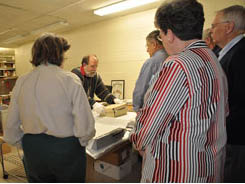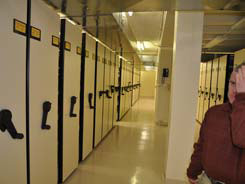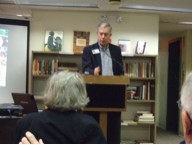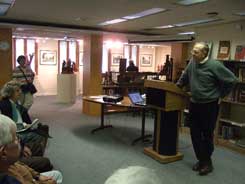Back
to Newsletter List
____________________
Summer
2010 Newsletter
Building
a Community – The Surprising Stories of Durham Presbyterians….
Saturday,
16 October 2010
Durham
often gets a bad rap. Other than Duke University, the Duke and
VA hospitals, and the Durham Bulls, what is there to bring anyone
to this post-Civil War city? And isn’t Presbyterian history
all about the brave Scots or Scotch-Irish or even Waldensians
coming to the New World and bringing their religion with them?
Or founding schools, colleges, and literary societies in antebellum
North Carolina? It certainly is that, in part. But just as interesting
and sometimes more surprising are the stories of their descendants
who found themselves faced with equally great challenges in
the later 19th century and throughout the 20th century.
| |
|
|
First
Presbyterian Church, Durham |
First
Presbyterian Church of Durham is the perfect example of
this, and Dr. Peter Fish of Duke University, the church historian,
will tell us about it. Durham came into being almost overnight
as an industrial city. The soldiers in Sherman’s army,
camped near Bennett Place at the end of the Civil War, discovered
the brightleaf tobacco of John Ruffin Green and ordered more
of it after they returned home.
Green
and W.T. Blackwell soon formed the Bull Durham Tobacco Company,
and in 1874 Washington Duke moved his operations into Durham
as well. The town was incorporated in 1869. When the First Presbyterian
Church was organized on the last day of 1871, the town was full
of tobacco warehouses and factories, a growing number of textile
mills in East and West Durham, a few well-to-do families, and
a great many black and white workers.
The
first frame church was built on the present downtown site, Roxboro
and Main, in 1875. A larger brick building replaced it in 1890.
Thanks to the generosity of tobacco and textile magnate George
Watts, a Sunday School was added in 1913, the present sanctuary
in 1916, and Church House in 1923.
As
outreach to the communities of mill workers housed next to the
giant textile mills, First Presbyterian began Sunday Schools
at Erwin Mills in West Durham and in the Edgemont community
in East Durham in 1892, and a mission at the Pearl Cotton Mill
in 1894. These became Blacknall Memorial Presbyterian Church,
Fuller Memorial (now A.R.P.), and Trinity Ave. Presbyterian
Church. Their first church-sponsored foreign mission was planted
in 1895 in central Brazil, followed by one in Korea and others
in Africa and Cuba.
In
the 1920s and 30s, there were lively discussions about temperance
and biological evolution, but during the Great Depression the
church struggled with the more immediate needs of the congregation
and the community, including a major strike in textile mills
across the South (1934).
Then
came World
War II. Camp Butner was built 14 miles north of Durham as
an army training facility, and homesick young soldiers began
to flood into Durham. The whole congregation at First Church,
led by their new minister Rev. Kelsey Regen and the church hostess
Clara Matthis, turned the church into a home away from home
for the newly enlisted men and their officers—while careful
to keep them separate! When Butner became a major redeployment
center in 1943 with a huge army hospital, the congregation was
welcoming more veterans and those recovering from wounds to
the body, mind, and spirit. One of our officers, Mrs. Ann Myhre,
is the niece of Dr, Regen and will share wonderful pictures
and stories of this era as well as the next.
The
important roles of women and African-Americans during the war
led them to seek increased respect and responsibility in the
years that followed. First Presbyterian Church of Durham was
a leader in their recognition. In 1954, the session of First
Presbyterian overtured Granville Presbytery to endorse ordination
and installation of women as elders and deacons.
The
struggle in Durham over African-American civil
rights had begun in the 1930s but intensified during WWII
when the presence of black GIs led to discrimination and violence
against them. A bi-racial committee of ministers was formed
in 1944 to improve racial cooperation. In 1955, only one year
after Brown v. the Board of Education, First Presbyterian
voted to seat all who sought to worship, while at the same time
continuing its traditional support for Presbyterianism in the
city’s African-American community. Throughout this period,
Dr. Regen and his congregation publicly supported equal rights
and were sometimes vilified as a result.
Less
controversially, in 1950 he and Dr. William Bennett of Trinity
Avenue revived the Presbyterian student group at Duke University,
and eventually persuaded Synod to fund it.
Suburbanization
in the 1950s and 60s led many churches to move, but First decided
to stay “Downtown by history and by choice.” They
built a new Christian Education building in 1964 and have since
then developed the Presbyterian Urban Ministry, based at the
church. The Day School, founded in 1970, seeks to provide a
high quality of care to a diverse group of children.
Hayti
and St. Joseph’s A.M.E. Church
The boom-town atmosphere of early Durham attracted both black
and white entrepreneurs. Since African-American workers were
not given housing in mill villages and were not welcome in the
white-owned businesses, they soon developed their own thriving
business center known as Hayti (“Hay-tie”). The
NC Mutual Insurance Co., established in 1898, invested in construction
of hundreds of small rental houses, duplexes, and small businesses,
and it soon became the largest black-owned business in America.
Lincoln Hospital opened in 1905, and the National Religious
Training School opened as a private school in 1910. Bought by
the state in 1923, it became the NC College for Negroes in 1925,
the nation’s first state-supported liberal arts college
for African-Americans. By the 1940s Parrish St. in Hayti was
referred to as the “Negro Wall Street of America.”
St.
Joseph’s A.M.E. (1869) and White Rock Baptist (1873)
were central to the community. Yet in the 1960s, 200 acres in
the heart of Hayti, including White Rock Baptist Church, were
knocked down to make way for the Freeway. It took a major effort
by the whole community to save St. Joseph’s. It is now
the Hayti Heritage
Center, including performance space, a dance studio, an
art gallery, classrooms, and rooms for private events. We will
have a tour of this beautifully renovated building after lunch
on October 16.
If
you have time after our meeting, you may want to stop by one
of the following:
____________________
Question
for the Day
Why
is a stained glass portrait of Washington Duke in a window at
the Hayti Heritage Center?
The
Long Answer:
Washington Duke was born in 1820 and grew up as the eighth of
ten children on a farm in what was then Orange County. He left
home at 21 to become a tenant farmer, but eventually accumulated
300 acres. He disapproved of slavery and owned only one slave,
a house-keeper, but did rent the labor of neighboring slaves
as needed. By 1858 both his first and second wife and one son
had died early, leaving him with four children to raise. Although
a Unionist, the conscription acts forced him to join the Confederate
Navy at the end of 1863.
He
began to grow tobacco about 1859, but, aware of the growing
popularity of manufactured brightleaf smoking tobacco, he sold
or leased his farm before going to war, requiring payments to
be made in tobacco and stored at his homeplace. Captured during
the war, he was released in New Bern and walked home –
135 miles. He regained his land, and in a small log building
began to manufacture a smoking tobacco called "Pro Bono
Publico.” In 1874, W. Duke and Sons built a new factory
in Durham, and in 1884 the Dukes were the first to use a cigarette-rolling
machine to replace the slow hand-rolling process. Their fortunes
were made.
Washington
Duke had no formal education. His son, James B. Duke, once remarked:
"My old daddy always said that if he amounted to anything
in life it was due to the Methodist circuit riders who frequently
visited his home and whose preaching and counsel brought out
the best that was in him." In turn he donated to Methodist
causes, including construction of new buildings for the Methodist
and African Methodist Episcopal churches in Durham – in
1891 helping the black community build St. Joseph’s as
a beautiful and elegant church.
Trinity
College, a Methodist institution in Randolph Co. moved to Durham
in 1892, with help from Washington Duke and Julian S. Carr,
another Methodist tobacco magnate. In 1896 Duke gave Trinity
an endowment of $100,000 with the stipulation that the college
"open its doors to women, placing them on an equal footing
with men." He died in 1905. His son, James B. Duke, gave
in 1924 a very large endowment, for which the college was renamed.
As
stern as Washington Duke looks in the window portrait, it is
perhaps his stern sense of fairness that still lights the Hayti
Heritage Center.
____________________
Executive
Board Members
John
Myhre, President
1005 Park Ave., Garner, NC 27529
Phone: (919) 772-5514
E-mail: johnmyhre@nc.rr.com
Joy
Heitmann, Secretary
5021 Elaine Ave., Raleigh, NC 27610
Phone: (919) 862-0529
E-mail: joy_heitmann@mindspring.com
Arthur
H. Burgess, Jr., Treasurer
P.O. Box 2587, Hickory, NC 28603
Phone: (828) 322-1776
E-mail: ahbco@aol.com
Ann
Myhre, Awards Chair
1005 Park Ave., Garner, NC 27529
Phone: (919) 772-5514
E-mail: annmyhre@nc.rr.com
Sally
MacLeod Owens, Membership Chair
710 N. Person Street #204, Raleigh, NC 27604
Phone: (919)-835-0920
Email: sally.owens76@gmail.com
Tony
Brewer, Program Chair
915 Evans Dr., Sanford, NC 27330
Phone: (919) 776-8091
Email: abrewer8091@windstream.net
Barbara
T. Cain, Newsletter Editor
1041 Shelley Road, Raleigh, NC 27609
Phone: (919)-782-0944
E-mail: btcain@nc.rr.com
Sam
Martin, Publicity Chair
P.O. Box 1037, Biscoe, NC 27209-1037
Phone: (910) 428-4165
E-mail: smartin8@embarqmail.com
Dr.
Donald B. Saunders, Past President
P.O. Box 1846, Blowing Rock, NC 28605
Phone: (828) 295-8917
E-mail: saundersdb@appstate.edu
____________________
Martha
McLeod Honored at Bethesda Church, Aberdeen
Martha McLeod, a life member and former president of NCPHS,
was honored May 9, 2010 at Bethesda Presbyterian Church in Aberdeen.
The congregation dedicated a new pulpit Bible (New Revised Standard
Version) in Martha's honor. Martha was Director of Christian
Education for many years and was the congregation's first woman
elder. She has held many other positions. The previous pulpit
Bible was given by Martha in honor of her mother, Sarah Cranor
McLeod (Mrs. John D. McLeod, Sr.). This McLeod family has called
Bethesda Church home for most of the congregation's 222 years.
Bill
and Wilma Craig honored in Gaston County
Bill and Wilma Ratchford Craig, longtime members and former
officeholders of our society, were signally honored at a celebration
hosted by the Gaston County Historical and Art Museum on May
22. The Craigs were cited for a “lifetime of dedicated
service” to Gaston County’s rich history, especially
in historical preservation. Also noted in the citation were
Bill and Wilma’s activities in promoting and protecting
the environment, their prominent roles in the agricultural life
of Gaston County, and their service to history and the community
generally.
The
museum was born on July 4, 1976, and Bill chaired the committee
that brought it into being. Since then they have devoted both
time and treasure to helping ensure that the museum was an institution
of which Gaston County could be proud. A visit to the museum’s
website—better yet to the museum itself—shows that
this has been well accomplished.
The
Craigs are both descended from early Scotch-Irish Presbyterian
settlers, and their abiding faith has led them to be active
in church affairs for many years. The award recognized this
in stressing their steadfastness in a commitment to doing what
is right, their dedication to truth, their teamwork in working
with others, and their appreciation to God for his gift to them
of the love of nature, history, and community. To which all
who know the Craigs will add a resounding “Amen!”.
__________________
Member
Obituaries
William
"Bill" Randall of Lillington, NC has died. He
is survived by wife, Margaret. The Randalls have been active
members of Lillington Presbyterian Church, where Bill served
as elder and in other positions. Margaret has been Moderator
of Presbyterian Women. The Randalls enjoyed at least one NCPHS
tour of churches in recent years.
Jamie D. Stimson of Statesville has died. He was a
graduate of Davidson College and Union Theological Seminary,
Richmond, VA. Jamie, an ordained Presbyterian minister served
pastorates in North Carolina, South Carolina, Virginia, District
of Columbia, and Tennessee. He was predeceased by wife Nellie
Gray Sides Stimson, also a history buff and member of our society.
Jamie is survived by two sons and two daughters. He was active
in historical organizations in Statesville during his retirement
years.
__________________
Awards
A number of Awards of Merit were given this year for excellent
church histories:
Bethany Presbyterian Church, Lumberton.
134th Anniversary Souvenir Book, 1875-2009.
Black Mountain Presbyterian Church, Black Mountain.
A Pictorial History.
History of the Presbytery of Coastal Carolina,
1983-2007.
First Presbyterian, Fayetteville. Fling Wide the
Gates, by Mary Hayslip.
Oakland Presbyterian Church, Clayton.
Great Is Our Heritage.
Our sincere congratulations to all who helped to create these!
________________
Spring
Tour, 2010
Churches
in the Swannanoa Valley
Montreat
in the springtime! We visited the lovely memorial garden near
the entrance gate, and then heard about the Montreat
Presbyterian Church, UPUSA – a thriving church without
walls.
Black
Mountain Presbyterian Church recently published a very fine
pictorial history of the congregation. During our visit to the
church, the book was recognized by an award for excellence,
presented by Awards Chair Ann Myhre (right) to Florence Shelor,
Hilda Hobson, and Charlotte Sprawls.
Rev.
Steve Runholt told us about his congregation and about his role
as college chaplain at Warren
Wilson Presbyterian Church in Swannanoa.
Afternoon
Tour of Warren Wilson College
College
Archivist Diane Sanderson led us on a very interesting and entertaining
tour of the campus, ably assisted by Ernst Laursen, former manager
of the college farm.
We
walked.
We
rode...
and
enjoyed seeing the working horses
from the college farm!
That
evening, Ron Vinson of the Presbyterian Heritage Center (foreground)
and other members of the Society heard about the long and fascinating
history of the First
Presbyterian Church of Swannanoa, formerly Piney Grove.
The
first day ended with an excellent dinner at Swannanoa!
Tour
of the Presbyterian Heritage Center
| Ron
Vinson giving an interesting behind-the-scenes tour of
areas for document conservation and exhibit preparation
at the Presbyterian Heritage Center at Montreat.
|
Moveable
shelving at Presbyterian Heritage Center at Montreat. |
 |
 |
| Pete
Reary, President of the Mountain Retreat Center, explains
some of the history of Montreat and their close working
relationship with the Heritage Center. |
Rev.
Richard Ray, member of the board of Directors, explains
that the Center is entirely independent from the UPUSA General
Assembly and relies on the support of individuals and congregations. |
 |
 |
____________________
Schedule
and Registration Form for the Summer Tour
October
16, 2010
9:00
– Registration, First Presbyterian Church, 305 East Main
Street, Durham, NC 27701-3799
9:30
– First Presbyterian Church History and Tour – Dr.
Peter Fish, Duke University.
Break
Tales of Dr. Kelsey Regen – Ann Myhre
Short
Tour of Downtown Durham.
12:00
– Lunch
12:45
– Business Meeting
1:30
– Visit Hayti Heritage Center, 804 Old Fayetteville St.,
Durham
2:30
– Leave for home, or explore other points of interest,
such as the Duke Chapel and Campus, the Nasher Museum of Art,
Duke Homestead and Tobacco Museum, or Bennett Place
Please
send form below and check (payable to NCPHS) by Friday, October
8, to NCPHS, P.O. Box 20804, Raleigh, NC 27619-0804. If you
have questions, please call our Program Chairman Tony Brewer
at 919-776-8091.
__________________
Suggested
accommodations:
We have not reserved a bloc of rooms for this meeting, but the
church suggested the following:
The
Durham Marriott at the Convention Center (Downtown)
201 Foster St., Durham, NC 27701. Phone: 919-768-6000 or 1-800-909-8375
Comfort
Inn University at the intersection of I-40, exit 270,
and US 15-501.
3508 Mt. Moriah Rd., Durham 27707. Phone: (919) 490-4949.
To
get to the church (6.7 miles), follow 15-501Business (Durham-Chapel
Hill Blvd./University Dr.) into downtown Durham. Go under the
Durham Freeway (NC 147) to Main St., turn right, and go 2 blocks
to Roxboro Road. Turn left on Roxboro Rd. and park behind the
church.
Please
send form below and check (payable to NCPHS) by October
8 to:
NCPHS
P.O. Box 20804
Raleigh, NC 27619-0804
If
you have questions, please call our Program Chairman Tony Brewer
at 919-776-8091.
_
_ _ _ _ _ _ _ _ _ _ _ _ _ _ _ _ _ _ _ _ _ _ _ _ _ _ _ _ _ _
_ _ _ _ _ _ _ _
Registration Form for the Upcoming Tour
Name(s):
______________________________________________________
_______________________________________________________________
Address:
______________________________________________________
Telephone:
______________________
Email:
______________________________________
No.
of registrations ____ @ $17.00 ea= $ ___________
**Dues:
__ Individual $10
__ Family $15
__ Individual Life Membership $100
**If
you have not yet paid your dues for 2010, or if you would like
to join, please include them with your registration. If you
will not be able to come to the meeting, just put your information
on the form and send it with your check to the same address.
Back dues are forgiven. Of course, you do not have to be a member
to come to our meetings, but we do hope you are willing to pay
the small membership fee to sustain our organization.
Total
enclosed: $________
Please
send this form with your check (made out to NCPHS) by
October 8 to:
NCPHS
PO Box 20804
Raleigh, NC 27619-0804
Back
to Newsletter List

